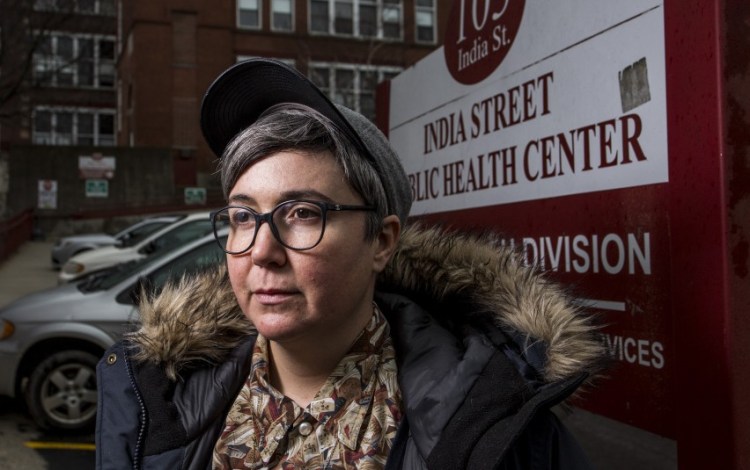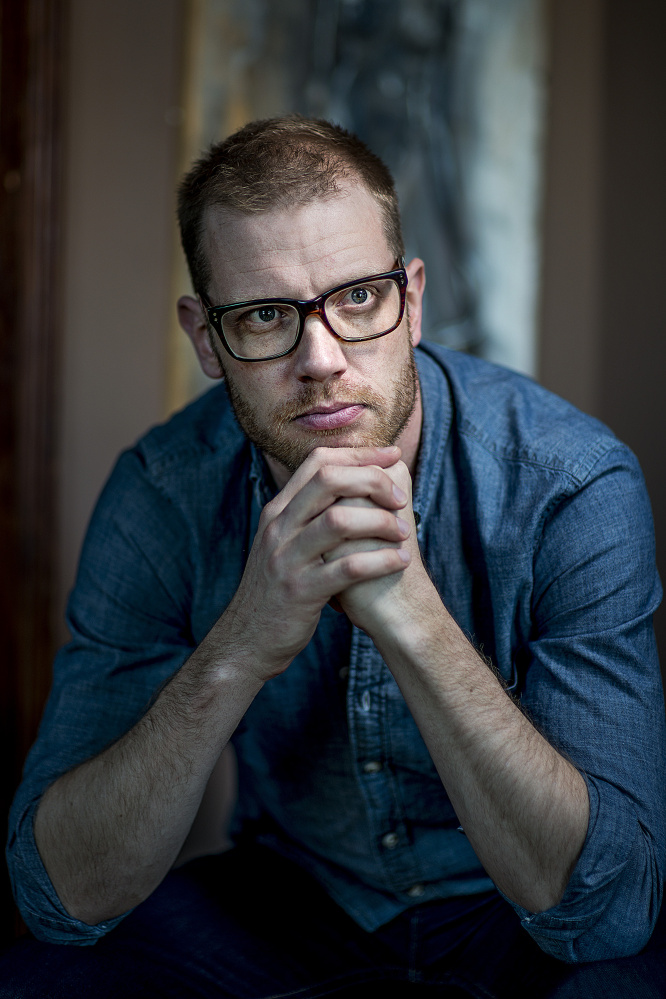Koral Mitchell has relied on a city-run clinic on India Street for a variety of health care needs for nearly a decade.
She receives counseling and primary care, and treatment for HIV and hepatitis. She also has gotten clean hypodermic needles there through a needle exchange program intended to prevent the spread of infections among intravenous drug users.
So Mitchell is worried about what will happen if the City Council approves City Manager Jon Jennings’ proposal to close the India Street Public Health Center as part of next year’s budget and transition services to a nonprofit clinic on Park Avenue.
“It’s devastating. If it closes, that will be the death of me,” said Mitchell, who fears it will be harder to remain clean and sober. “I’ll go downhill.”
City officials say patients will be able to get the same services at the Portland Community Health Center at 180 Park Ave. The nonprofit is eligible for higher reimbursement rates for the services it provides. But patients and health care advocates are worried that vulnerable people with complex medical needs will fall through the cracks, get sicker and wind up in emergency rooms.
“Even if you plot it out perfectly, somebody is going to get lost in the shuffle. I don’t see how that is not possible,” said Erika Ziller, a health policy researcher and faculty member at the University of Southern Maine’s graduate center. “I just don’t know this plan has been fully thought out to the extent it needs to be to be effective.”
HEALTH OFFICIAL CONFIDENT IN PLAN
The Portland Community Health Center’s patients pay for care on a sliding scale based on ability to pay, including free services for people without incomes. The center currently serves more than 6,600 patients. It’s unclear how it will ramp up its services to accommodate the additional patients, including hundreds who are HIV-positive, because planning is only in the initial stages.
Dawn Stiles, Portland’s health and human services director, said the city has a “skeleton of a transition plan laid out.” But she is confident, she said, that the nonprofit will be able to ramp up services and successfully secure state and federal grants that accounted for about half of India Street’s $1.4 million budget in 2015.
“I’m not concerned in terms of what we’re transitioning,” Stiles said. “We all want the best outcomes for our community members.”
From 2014 to 2015, 230 patients received HIV-positive health care at India Street, while 1,405 people were tested for HIV and other sexually transmitted diseases, according to the most recent annual report. The needle exchange program served 808 enrollees, including 316 new individuals, collecting and redistributing more than 140,000 needles.
Portland Community Health Center CEO Leslie Clark said the clinic is committed to making the transition as seamless as possible.
“These are really critical programs so we are really committed to doing whatever we can to make sure none of them are lost,” Clark said.
The proposal will go before the City Council’s Finance Committee from 2-5 p.m. Thursday at City Hall. The committee is charged with making a recommendation to the full council. A public hearing and voted on the proposal is scheduled for April 21.
Mayor Ethan Strimling said there has been “a lot of push-back” against the proposal. During his weekly radio appearance on WGAN news radio, Strimling said, “We have a lot of tough questions to ask. We don’t know where it will land in the end.”
But some feel like it’s a foregone conclusion that the city will close the clinic.
“It feels like a done deal,” said Megan Hannon, executive director of the Frannie Peabody Center, a Portland nonprofit that is the largest HIV/AIDs service organization in the state. “If the city of Portland is not interested in providing health care services, they won’t provide them well.”
She added, “We’re all committed to making sure our patients and clients continue to receive uninterrupted high-quality care.”
According to the Public Health Division’s 2014-2015 annual report, the India Street clinic had an annual budget of $1.4 million, nearly half of which – $625,000 – was paid for by federal and state grants. An additional $378,000 came from property taxes.
FINANCIAL FACTOR, PATIENTS’ WORRIES
City officials are justifying the move because the independent Portland Community Health Center can receive higher reimbursement rates from Medicaid or private insurance. Such reimbursements accounted for $424,000 in revenue for the India Street clinic.
The community health center currently has an operating budget of $5.2 million and 63 employees and is overseen by a board of directors, the majority of whom are patients.
Several patients said this week they are skeptical that the city and the community health center can live up to the promise that services will be continued.
The nonprofit health clinic based on Park Avenue only serves about 50 HIV-positive patients and would have to ramp up services for more than 220 HIV-positive patients currently accessing services at the city-run clinic on India Street. Clark said the nonprofit clinic would consider hiring as many of the India Street clinic’s 15 employees as possible to preserve relationships, but there is no guarantee that would happen.
Mike White, a 48-year-old HIV-positive patient, thinks changing providers and possibly breaking up locations would create a huge obstacle for patients who currently have access to primary care and specialized services, such as HIV and infectious disease specialists, all under one roof.
“I know when city things get transferred, they do get lost in the cracks,” said White, who has been a patient at India Street since 2005. “It would be a horrible loss for the community if those things went away.”
David Timm agreed. He’s been a patient at India Street for the past 12 years. He credits the doctors with saving his life. He said his is HIV is no longer detectable.
Timm said he has private insurance, is gainfully employed and has no problem getting to appointments, but most of the other patients at the clinic are not so lucky.
“I’m going to be fine, but it’s the other patents that will not be,” the 40-year-old said. “They’re going to have a very hard time getting to all of these appointments because they have a hard enough time getting to one appointment at one location.”
The nonprofit health center, which is has four locations in addition to the main office on Park Avenue across from King Middle School, also would decide where and how to operate its needle exchange.
CONFLICT OVER GOVERNMENT ROLE
Jennings, the city manager, described his budget proposal as a way to get back to basics, such as paving roads and fixing sidewalks. He has said that by providing direct clinical services to patients, Portland is an outlier among U.S. cities. Instead, the city should concentrate on policies and leave the clinical work to hospitals and other nonprofits.
Advocates are pushing back against that notion.
Ann Spencer has been volunteering at the needle exchange for about a year. She is also a doctoral candidate who is writing a dissertation about the opioid epidemic, both in Maine and nationally.
Spencer said government should have a role in the health of its vulnerable populations, and should be devoting more funding to public services offered by the clinic.
“The notion that any of these programs ought to be closed and the work of public health should be picked up by a nonprofit is dubious and dangerous,” she said.
Copy the Story Link
Send questions/comments to the editors.





Success. Please wait for the page to reload. If the page does not reload within 5 seconds, please refresh the page.
Enter your email and password to access comments.
Hi, to comment on stories you must . This profile is in addition to your subscription and website login.
Already have a commenting profile? .
Invalid username/password.
Please check your email to confirm and complete your registration.
Only subscribers are eligible to post comments. Please subscribe or login first for digital access. Here’s why.
Use the form below to reset your password. When you've submitted your account email, we will send an email with a reset code.